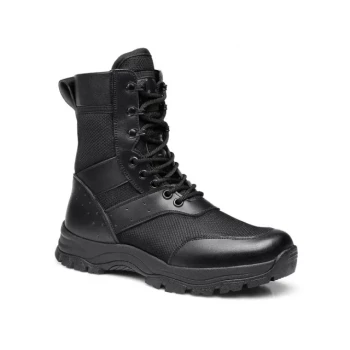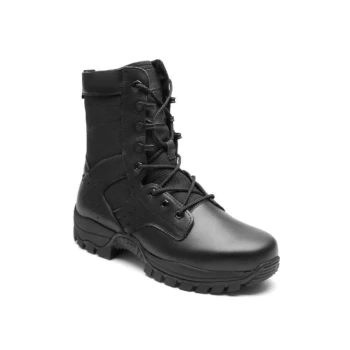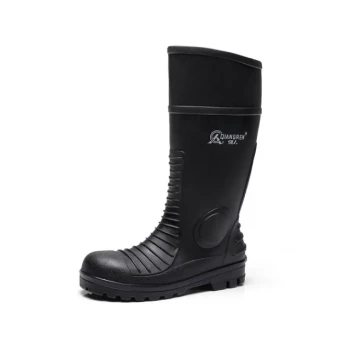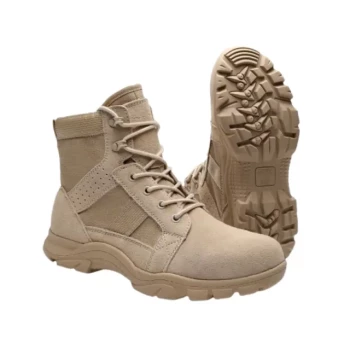At their core, cowboy boots are suitable for farm work due to a combination of four key characteristics: highly durable materials like thick leather, a high shaft for protection and ankle support, a stacked heel for stability on uneven terrain, and a robust, often slip-resistant outsole. These features, born from the demands of ranching, provide a functional foundation for the rigors of a farm environment.
The traditional cowboy boot was designed for a rider, but the modern work-focused cowboy boot has evolved. Its true value for farm work lies not just in its classic design, but in specific adaptations like enhanced waterproofing, non-skid outsoles, and supportive insoles that prioritize safety and all-day comfort.
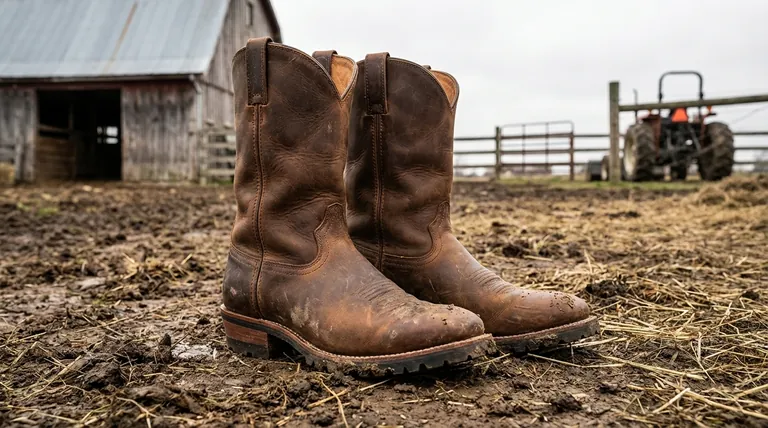
The Anatomy of a Farm-Ready Cowboy Boot
Understanding why certain features matter is crucial to selecting a boot that works for you, not against you. Each component serves a distinct, practical purpose in a demanding agricultural setting.
Material Durability: The First Line of Defense
The primary material is typically full-grain leather, chosen for its exceptional resistance to wear, tear, and abrasion. This thick hide acts as a crucial barrier, protecting your feet from sharp objects, rough underbrush, and daily impacts. Many modern work versions are also treated to be waterproof, keeping feet dry in muddy or wet conditions.
The High Shaft: More Than Just Style
The high shaft, extending up the calf, provides two major benefits. First, it offers significant ankle support, which is vital when walking on uneven or unstable ground. Second, it serves as a shield, protecting your lower legs from debris, snake bites, and splashes from farm chemicals.
The Heel and Outsole: The Foundation of Stability
A traditional cowboy boot features a stacked heel, which helps secure a rider's foot in a stirrup but also provides stability when walking on soft or rough terrain. For farm work, this is paired with a durable, oil- and slip-resistant outsole. This modern adaptation is critical for maintaining traction in slick, muddy, or oily conditions.
Internal Support: The Key to All-Day Use
Modern work-oriented cowboy boots include features for long-term comfort. A steel or composite shank is often embedded in the midsole to distribute weight evenly and protect the arch of the foot. Quality insoles and moisture-wicking linings help manage perspiration and provide cushioning during long hours on your feet.
Understanding the Trade-offs
No footwear is perfect for every situation. Being aware of the potential downsides of cowboy boots for farm work is essential for making an informed decision.
The Break-In Period
High-quality leather boots often require a break-in period. During this time, the thick leather can feel stiff and uncomfortable, potentially causing blisters or sore spots until it molds to the shape of your foot.
Limited Breathability
Even with moisture-wicking liners, a thick leather boot is inherently less breathable than other types of footwear. During hot weather or strenuous work, this can lead to hot, sweaty feet, increasing the risk of foot odor or fungal infections if not managed properly.
Making the Right Choice for Your Work
To select the best boot, align your choice with the primary demands of your tasks.
- If your primary focus is heavy labor and safety: Prioritize boots with a certified safety toe (steel or composite) and a pronounced oil- and slip-resistant outsole.
- If your primary focus is a mix of riding and general farm chores: A traditional design from a reputable brand like Ariat, Justin, or Tony Lama with a durable sole and comfortable insole is an excellent choice.
- If your primary focus is working in extremely wet or muddy conditions: While many cowboy boots are waterproof, you may want to consider specialized rubber or PVC boots as a more practical alternative for these specific tasks.
Ultimately, the right boot combines proven durability with modern safety and comfort technology to keep you productive and protected.
Summary Table:
| Key Characteristic | Primary Benefit for Farm Work |
|---|---|
| Durable Full-Grain Leather | Resists abrasion, punctures, and impacts. |
| High Shaft | Provides ankle support and protects from debris. |
| Stacked Heel & Slip-Resistant Outsole | Ensures stability and traction on uneven terrain. |
| Internal Support (Shank/Insole) | Offers all-day comfort and arch support. |
Ready for boots that combine tradition with modern performance?
As a large-scale manufacturer, 3515 produces a comprehensive range of durable work boots for distributors, brand owners, and bulk clients. Our production capabilities encompass all types of footwear, including farm-ready cowboy boots built with the features you need for safety and comfort.
Contact us today to discuss your footwear needs and discover how we can deliver quality and value for your business.
Visual Guide
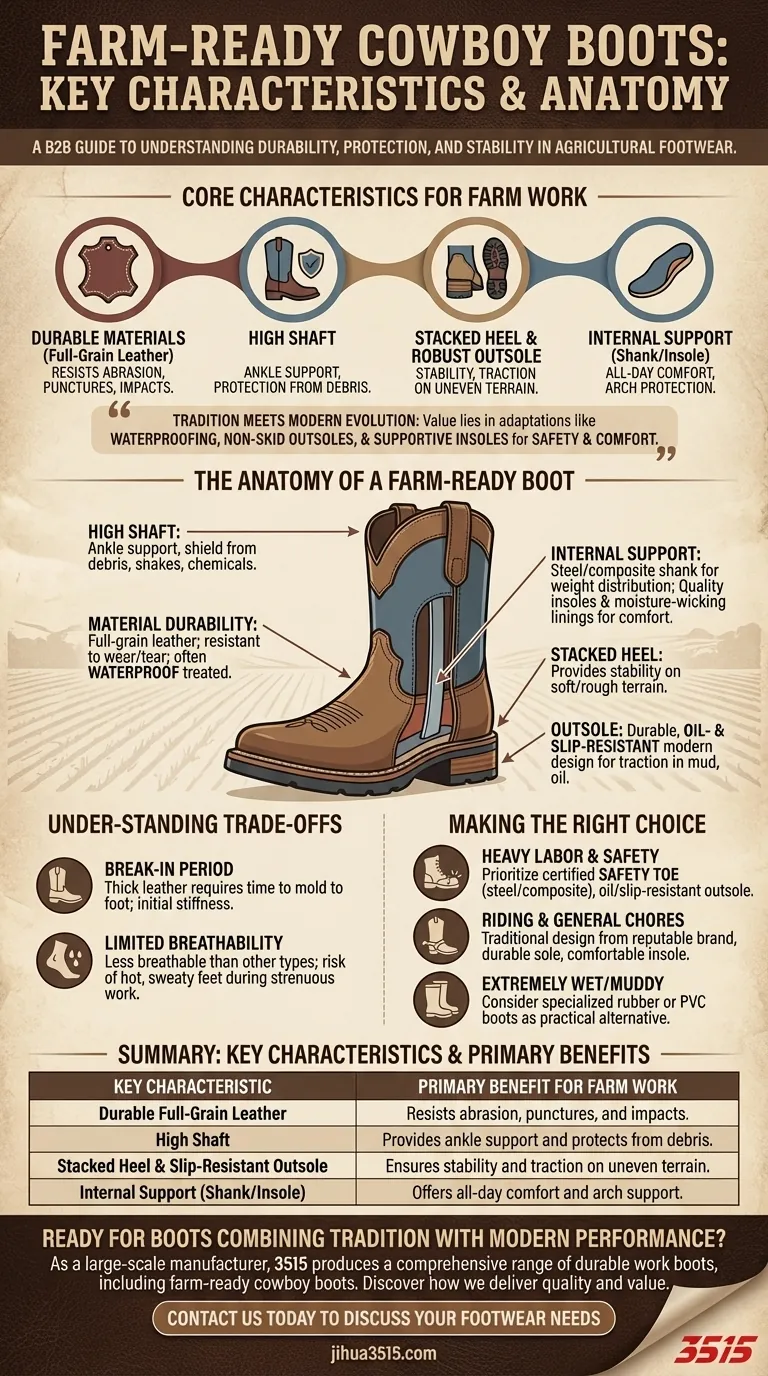
Related Products
- High Performance Fire-Retardant Waterproof Safety Boots
- Premium High-Cut Waterproof Safety Boots Manufacturing & Wholesale Solutions
- Premium Wholesale Waterproof Safety Boots High Performance Protection for Industrial Markets
- Puncture-Resistant Velcro Safety Boots for Wholesale & Custom Manufacturing
- Premium Wholesale Wheat Nubuck Safety Boot with Rapid Lacing System
People Also Ask
- How do professional construction boots improve operational efficiency? Boost Site Productivity with Advanced Footwear
- What physical protections are provided by the S1 standard and integrated steel toecaps in industrial safety boots? Ensure Ultimate Foot Safety & Hazard Protection
- What safety standards should oilfield work boots meet? Ensure OSHA & ASTM F2413 Compliance
- What is the core protective function of steel-toe safety shoes in preventing lower limb injuries caused by chainsaws?
- Why is safety the top priority when selecting oilfield work boots? Essential Protection for High-Risk Environments














